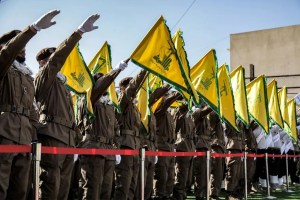Jerusalem
On Tuesday, I was driving down to an Israeli army headquarters on the border with Gaza as a massive convoy of police cars and black bullet-proof limousines forced me onto the side of the road by the town of Ofakim. In Israel, only one man travels in a convoy that large.
It was November 7, a month after the Hamas attack on Israeli communities in which 1,400 were murdered and the war between Israel and Hamas in Gaza began. Even during peacetime the prime minister’s movements are shrouded in secrecy until he is safely back in one of his homes or offices.
Many Israelis, including those who voted for his government, now see Netanyahu as Israel’s curse
Seeing the convoy headed for the border area, I assumed that Benjamin Netanyahu was finally about to visit one of the devastated communities whose residents had been murdered or taken hostage. In twenty-seven years as a journalist in Israel, a career dominated by one political figure, I have always hoped that this highly intelligent man would decide to do the right thing. But at the next junction, instead of continuing to the kibbutzim near the border, the convoy turned left and drove deep into the Negev Desert.
At the Ze’elim training base, he met soldiers of the Egoz commando unit, who were lined up in combat fatigues and face-masks outside an urban-warfare training facility, designed to resemble streets in Gaza City, for a photo with the prime minister.
Highly stage-managed affairs are the only sort of public appearances Netanyahu has been making in this month of war. His staff have given instructions to the Israel Defense Forces that he can be seen only with high-ranking generals or young conscripts. In other words, only with soldiers who have to keep their mouths shut while meeting him.
Two-thirds of Israelis in military uniform right now are reservists — 360,000 of them. They are soldiers who will carry out orders but they are also civilians who have no obligation to hold their tongues. In two incidents early in the war, when Netanyahu encountered reserve soldiers, he was heckled and shouted at to resign. Since then, he has been kept away from reservists and only the government press office is there to film him when he visits the army. No independent media is allowed, to avoid any impromptu protest being seen on camera.
Israel’s wartime leader cannot meet most of his country’s soldiers in case he has to respond to criticism. He has yet to meet any families of the 1,400 dead or visit any of the devastated towns or kibbutzim. He has had only two meetings with the families of the 240 hostages held in Gaza. They were tense events to which his office also invited political supporters masquerading as relatives, so he would have some backing. He has held just one press conference with the Israeli media in which reporters were allowed to ask questions, and ended it after only seven questions when he could no longer evade demands that he take responsibility.
Instead, he has taken to briefing journalists off the record. The messages in these briefings have one direction: the IDF and the intelligence community failed to provide any warning of the October 7 attack. He may have been Israel’s prime minister for the past ten months and for twelve of the past fourteenth years, and developed Israel’s doctrine whereby Hamas was allowed to remain in control of the Gaza Strip, but he takes no responsibility for what happened.
In another off-record briefing on Monday he said the connection between the announcements in previous months by reservists that they would refuse to serve if his government passed its legislation eviscerating the powers of the independent Supreme Court and Hamas’s motivation for attack would have to be examined. Once it was reported, he tried to deny he had said such a thing.
Netanyahu’s partisans are fighting an online battle to push his self-exonerating narrative. Some diehard Bibists are spreading conspiracy theories on social media about “treason” inside Israel’s defense establishment. The father of Yaron Shai, an infantry sergeant who was killed in one of the first battles on the border on October 7, has received tweets from Netanyahu supporters that his son “opened the gate” for Hamas.
None of this is working. The chiefs of the IDF and the intelligence branches were all quick to take responsibility for the intelligence and operational failures of October 7. They are all expected to do the honorable thing once the war is over and resign. In a poll last week, half of Israelis said they trusted the IDF commanders more than Netanyahu to lead Israel in this war. Twenty percent said they trusted them equally and only a tiny minority said they trusted Netanyahu more than the generals. In another survey, three-quarters of Israelis said he should resign. A third of those want him to go immediately; two-thirds were prepared to wait until the end of the war, but no later. In poll after poll, Netanyahu’s Likud party has lost 40 percent of the votes it won a year ago in the election. His ruling coalition would win only two-thirds of the seats it did then.
Netanyahu, whose trademark since entering the rumpled and sweaty world of Israeli politics in 1987, was always his immaculate suits and crisp white or powder-blue shirts, has taken to wearing black shirts in his public appearances. It is what his fellow members of the war cabinet, the former generals Benny Gantz and Yoav Gallant, have been wearing and he seems to want to be indistinguishable from them. In his televised statements, the master of rhetoric has changed his style and is now delivering updates in the manner of the popular chief military spokesman, Rear-Admiral Daniel Hagari.
Netanyahu is an aging conjurer who has suddenly realized that the audience has tired of his tricks and is forlornly scrambling to ape those of younger performers.
He no longer stays at one of his private residences in Jerusalem or Caesarea. Together with his wife, Sara, he has decamped to the Jerusalem villa of an American billionaire which is equipped with a nuclear bunker. While tens of thousands of young Israeli men and women who were studying or backpacking around the world rushed to return and enlist, their two sons remain abroad.
Netanyahu comes alive only when foreign leaders arrive on solidarity visits. That’s when he can wear his Zegna suits again and bask in the camera-light standing next to a fellow prime minister or a president. In a statement this week he said: “We are bringing here the leaders of the world,” as if they were coming because of him.
One foreign leader who has expressed an interest in visiting Israel to show his support has not yet been found time in Netanyahu’s schedule — Ukrainian President Volodymyr Zelensky. Some of Netanyahu’s critics in Jerusalem say it is his lingering respect for Vladimir Putin, whom he called “Israel’s friend,” that is delaying Zelensky’s arrival. But it is also partly due to fear of paling in comparison with Ukraine’s leader — the only other Jewish wartime leader in the world.
Netanyahu’s dysfunctionality extends to his government. This week, when the heritage minister Amihai Eliyahu said that Israel should drop a nuclear bomb on Gaza, Eliyahu’s party leader, Jewish Power boss Itamar Ben-Gvir, vetoed having him sacked. Netanyahu is powerless to act against the ministers of his far-right coalition. He announced instead that Eliyahu was “suspended” — a disciplinary procedure that doesn’t exist.
Meanwhile, the coalition’s ministers have refused to divert funds promised to them for their own communities’ special interests and spend them instead on the urgently needed relief effort for nearly 200,000 civilians who have been uprooted by the fighting.
The hardline coalition is also vetoing any serious strategic planning for the day after Israel’s ground campaign in Gaza. Their stated desire is a permanent return of Israel to the Gaza Strip and rebuilding the settlements dismantled there in 2005. Netanyahu cannot accept these demands as it would mean the end of the support of western governments, including the Biden administration. But he also can’t agree to the plans being discussed by Israel’s defence establishment, along with their American allies, to prepare for a return of the Palestinian Authority, which was ousted by Hamas’s bloody coup in 2007, to Gaza.
He is paralyzed, hemmed in by impossible political and military circumstances and his own responsibility for the worst tragedy to befall Israel in its seventy-five years. Two weeks ago, he turned seventy-four but there were no celebrations. The historian’s son still sees himself as the embodiment of Israel’s destiny and is not prepared to contemplate making way for a younger generation. Many Israelis, including those who voted for his government, now see him as Israel’s curse.
Young Israelis cannot remember an Israel not dominated by Netanyahu. In the Bezalel art school in Jerusalem, students who are told to draw a patrician figure unconsciously draw him. For so many years he has personified Israel’s history and present — self-confident, aggressive, sophisticated, cosmopolitan and deeply tribal all at once.
Netanyahu no longer represents Israel. He is not respected by its military or Israeli society, which for so long has been divided by his personal drama of political survival and now has no time for him. The people are too busy putting their differences aside and uniting behind the war effort, whether as soldiers or volunteers helping the thousands of bereaved and uprooted families. Once the war is over, they will turf him out.
Netanyahu is still prime minister, but he is yesterday’s man. Israel is already emerging from his curse.
This article was originally published in The Spectator’s UK magazine. Subscribe to the World edition here.


















